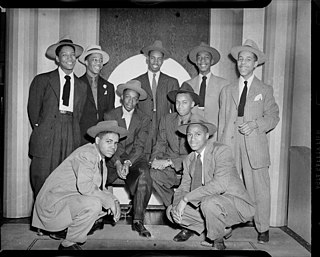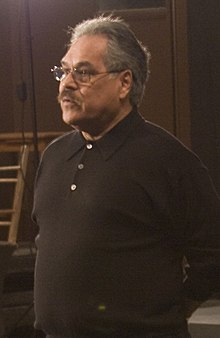
La Bamba is a 1987 American biographical drama film written and directed by Luis Valdez. The film follows the life and short-lived musical career of Mexican-American Chicano rock and roll star Ritchie Valens. The film stars Lou Diamond Phillips as Valens, Esai Morales, Rosanna DeSoto, Elizabeth Peña, Danielle von Zerneck and Joe Pantoliano. The film also covers the effect that Valens' career had on the lives of his half-brother Bob Morales, his girlfriend Donna Ludwig, and the rest of his family. The film is titled after a Mexican folk song of the same name, which Valens transformed into a rock and roll rendition in 1958. In 2017, La Bamba was included in the annual selection of 25 motion pictures added to the National Film Registry of the US Library of Congress being deemed "culturally, historically, or aesthetically significant" and recommended for preservation.

A zoot suit is a men's suit with high-waisted, wide-legged, tight-cuffed, pegged trousers, and a long coat with wide lapels and wide padded shoulders. It is most notable for its use as a cultural symbol among the Hepcat and Pachuco subcultures, although it was popular among African, Mexican, Filipino, Italian, and Japanese Americans in the 1940s.

Zoot Suit is a play written by Luis Valdez, featuring incidental music by Daniel Valdez and Lalo Guerrero. Zoot Suit is based on the Sleepy Lagoon murder trial and the Zoot Suit Riots. Debuting in 1979, Zoot Suit was the first Chicano play on Broadway. In 1981, Luis Valdez also directed a filmed version of the play, combining stage and film techniques.
Eduardo "Lalo" Guerrero was an American guitarist, singer and farm labor activist best known for his strong influence on later Latin musical artists.

Zoot Suit is a 1981 American independent drama musical film of the Broadway play Zoot Suit. Both the play and film were written and directed by Luis Valdez. The film stars Daniel Valdez, Edward James Olmos — both reprising their roles from the stage production — and Tyne Daly. Many members of the cast of the Broadway production also appeared in the film. Like the play, the film features music from Daniel Valdez and Lalo Guerrero, the "father of Chicano music."
El Teatro Campesino is a Chicano theatre company in California. Performing in both English and Spanish, El Teatro Campesino was founded in 1965 as the cultural arm of the United Farm Workers and the Chicano Movement with the "full support of César Chávez." Originally based in Delano, California, during the Delano Strike, the theatre is currently based in San Juan Bautista, California.

Juan Felipe Herrera is an American poet, performer, writer, cartoonist, teacher, and activist. Herrera was the 21st United States Poet Laureate from 2015 to 2017. He is a major figure in the literary field of Chicano poetry.
Los Vendidos is a one-act play by Chicano playwright Luis Valdez, a founding member of El Teatro Campesino. He wrote it in 1967, and it was first performed at the Brown Beret junta in Elysian Park, East Los Angeles. The play examines stereotypes of Latinos in California and how they are treated by local, state, and federal governments.
Diane Rodriguez was an American theatre artist who directed, wrote and performed. An OBIE Award winning actress, she was known for using comedy to confront various forms of oppression, often with special attention to issues of gender and sexuality.
I Am Joaquín is a 1969 short film by Luis Valdez, a project of his El Teatro Campesino.
Alma Martinez is a Mexican-American actress, stage director, and professor of theatre. She is best known for her roles in film and television shows including the Peabody Award winning drama series The Bridge with Demián Bichir and Diane Kruger and Corridos: Tales of Passion & Revolution with Linda Ronstadt as well as performances on Broadway, Off-Broadway, regional theatre, Mexican and European stages.
Daniel Valdez is an American actor, musician, composer, and activist. He is best known for his work as musical director of the films Zoot Suit (1981) and La Bamba (1987).

Richard Montoya is an American actor, director, producer, screenwriter, playwright, comedian, and co-founding member of the San Francisco based performance troupe Culture Clash. His work in theatre is largely comedy-based and centers around ideas of racism, immigration, discrimination, and identity in Latin-American communities. He follows in the steps of his father, famous activist José Montoya, and is known for creating social and political change through a variety of artistic expressions.
Anthony J. Garcia, known as Tony Garcia, is a playwright and the current Executive Artistic Director of Su Teatro in Denver, Colorado. He has written over 20 original plays and has served as Su Teatro's artistic director since 1989.
Jorge Alfonso Huerta is a Chicano scholar, author, and theater director. He specializes in Chicano and United States Latinx Theatre. He has written and edited several books specializing in Chicano theatre and is considered to be an authoritative expert in his field.
El Corrido is a 1976 musical comedy made for TV film directed and written by Luis Valdez, and produced by El Teatro Campesino. The film was adapted from Valdez's stage musical La Gran Carpa de los Rasquachis, which was also produced with El Teatro Campesino. El Corrido was aired on PBS on November 4, 1976 as part of its Ballad of a Farmworker television series on the series Visions.
A Mexican American is a resident of the United States who is of Mexican descent. Mexican American-related topics include the following:
This is an alphabetical index of topics related to Hispanic and Latino Americans.

Chicano cinema is an aspect of Mexican American cinema that refers to the filmmaking practices that emerged out of the cultural consciousness developed through the Chicano Movement. Luis Valdez is generally regarded as the first Chicano filmmaker and El Teatro Campesino as the first theater company.







